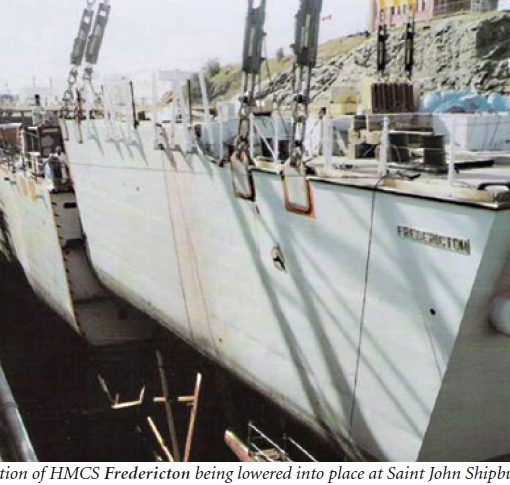A very brief and terse news article from CBC News has revealed that President Steve Durrell has left Irving Shipbuilding. This development is prompting great speculation about the internal stresses within the company and Durrell’s role in all of it. The company spokesperson declined to comment on the reason for his departure.
A number of news articles about Irving Shipbuilding include the word ‘hopeful’ in the title: “Irving Shipbuilding hopeful contract to be signed this year.” The article cited is about a contract between Irving and the firm of Hatch Mott MacDonald to modernize the Halifax shipyard. But, there has also been a lot of optimistic speculation about the impact of the shipbuilding activities contained within the NSPS on the local and provincial economies. Some disappointment was natural, but the mood seems to be souring in some quarters.
Against the optimistic view must be considered the three-year delay imposed by the federal government on the Arctic and Offshore Patrol Ship program. This came as a shock after speculation raised the prospect of cutting steel late in 2012 or 2013. That will obviously not happen. Also of concern has been that the workforce at Irving has been without a contract agreement for most of the year. The announcement came on 28 November that an agreement has been reached and ratified by a vote in favour of 69% of the membership: “CAW Local 1 Ratifies New Collective Agreement with Irving Shipbuilding.” The President of the local union, Karl Risser, said “increased benefits for workers and improves our ability to attract skilled trades to Halifax Shipyard to build new ships for Canada.” That the announcement of Durrell’s departure preceded the announcement of the labour agreement by only one day may be coincidental, or it may be significant.
Irving Shipbuilding has been mainly a repair yard with a reputable secondary line of building specialty small craft; in this case tugs. Their past experience in building major warships is a distant memory from a previous location. Irving’s current project, the nine Hero-class ‘mid-shore’ patrol vessels, two of which have been launched and six others are in various stages of construction, is an important step up in complexity but in no way adequately prepares the shipyard for building major warships. Durrell, who ‘came up through the ranks’ from the shop floor would have had early experience of the Canadian Patrol Frigate Program, but not from the perspective of leadership or even senior management.
The Irving yard in Halifax is in major need of modernization. For those who saw their facility in Saint John, the Halifax facility is obviously inferior. The history of the Halifax yard as mainly a repair facility shows on its infrastructure. Moreover, the on-off nature of repair work also affected how business was conducted in the front office. Margins are tight in the repair world, so there is little room for the ‘flash and shine’ that is highly visible when visiting major naval shipyards around the world. Upgrades to the entry and main reception area in the office building at Irving were a welcome sign that things were changing for the better.
A few superficial changes aside, the long history and pattern of operation at the Halifax shipyard has affected the culture of the organization. The new president of the organization will have to understand that to change Irving Shipbuilding from a repair organization to the builder of ultramodern warships will require a change of the institutional culture that has been created through decades of practice in Halifax: the experiences at Saint John are more than 20 years past and have had little relevance or impact here.
It may be that Steve Durrell was a representative of past practices. Whoever takes over will have to come with an incredible pedigree of experience and education from a world-class shipbuilder and a leading university. But, that will only be the first step in creating a new corporate culture. With a new six-year agreement with the workforce, whoever is hired will have some predictability with respect to costs. That the agreement was only passed by a two-thirds majority, which is large in politics but not impressive in trade unionism, means that there will still be a significant component of the workforce to be won over. The new corporate culture will affect everything and everyone. It will not be an easy job. Lets hope that optimism will continue to be the main sentiment and that the new president can move Irving Shipbuilding swiftly from the past and into the future.



